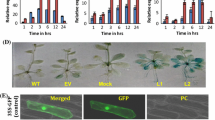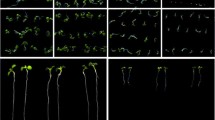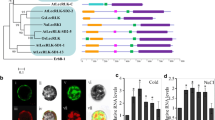Abstract
The plant lectin receptor-like kinases (LecRLKs) are involved in various signaling pathways but their role in salinity stress tolerance has not heretofore been well described. Salinity stress negatively affects plant growth/productivity and threatens food security worldwide. Based on functional gene-mining assay, we have isolated 34 salinity tolerant genes out of one million Escherichia coli (SOLR) transformants containing pea cDNAs grown in 0.8 M NaCl. Sequence analysis of one of these revealed homology to LecRLK, which possesses N-myristilation and N-glycosylation sites thus corroborating the protein to be a glycoconjugate. The homology based computational modeling of the kinase domain suggested high degree of conservation with the protein already known to be stress responsive in plants. The NaCl tolerance provided by PsLecRLK to the above bacteria was further confirmed in E. coli (DH5α). In planta studies showed that the expression of PsLecRLK cDNA was significantly upregulated in response to NaCl as compared to K+ and Li+ ions, suggesting the Na+ ion specific response. Transcript of the PsLecRLK gene accumulates mainly in roots and shoots. The purified 47 kDa recombinant PsLecRLK-KD (kinase domain) protein has been shown to phosphorylate general substrates like MBP and casein. This study not only suggests the conservation of the cellular response to high salinity stress across prokaryotes and plant kingdom but also provides impetus to develop novel concepts for better understanding of mechanism of stress tolerance in bacteria and plants. It also opens up new avenues for studying practical aspects of plant salinity tolerance for enhanced agricultural productivity.











Similar content being viewed by others
Abbreviations
- CSR:
-
cellular stress response
- E. coli :
-
Escherichia coli
- IPTG:
-
isopropyl thio-β-D-galactopyranoside
- LecRLK:
-
lectin receptor-like kinase
- MBP:
-
Mylein basic protein
References
Wyatt, S.E., Carpita, N.C.: The plant cytoskeleton-cell-wall continuum. Trends Cell Biol. 3, 413–417 (1993)
Gouget, A., Senchou, V., Govers, F., Sanson, A., Barre, A., Rougé, P., Pont-Lezica, R., Canut, H.: Lectin receptor kinases participate in protein-protein interactions to mediate plasma membrane-cell wall adhesions in Arabidopsis. Plant Physiol. 140, 81–90 (2006)
Walker, J.C.: Structure and function of the receptor-like protein kinases of higher plants. Plant Mol. Biol. 26, 1599–1609 (1994)
Nishiguchi, M., Yoshida, K., Sumizono, T., Tazaki, K.: A receptor-like protein kinase with a lectin-like domain from lombardy poplar: gene expression in response to wounding and characterization of phosphorylation activity. MGG. 267, 506–514 (2002)
Shiu, S.H., Bleecker, A.B.: Plant receptor-like kinase gene family: diversity, function, and signaling. Sci. STKE 2001, re22 (2001). (doi:10.1126/stke.2001.113.re22)
Herve, C., Serres, J., Dabos, P., Canut, H., Barre, A., Rouge, P., Lescure, B.: Characterization of the Arabidopsis lecRK-a genes: a member of a super family encoding putative receptors with an extracellular domain homologous to legume lectins. Plant Mol. Biol. 39, 671–682 (1999)
Navarro-Gochicoa, M.T., Camut, S., Timmers, A.C.J., Niebel, A., Herve, C., Boutet, E., Bono, J.J., Imberty, A., Cullimore, J.V.: Characterization of four lectin-like receptor kinases expressed in roots of medicago truncatula. structure, location, regulation of expression, and potential role in the symbiosis with sinorhizobium meliloti. Plant Physiol. 133, 1893–1910 (2003)
Barre, A., Herve, C., Lescure, B., Rouge, P.: Lectin receptor kinases in plants. Crit. Rev. Plant Sci. 21, 379–399 (2002)
Riou, C., Herve, C., Pacquit, V., Dabos, P., Lescure, B.: Expression of an Arabidopsis lectin kinase gene, lecRK-a1, is induced during senescence, wounding and in response to oligogalacturonic acids. Plant Physiol. Biochem. 40, 431–438 (2002)
Wan, J., Patel, A., Mathieu, M., Kim, S.Y., Xu, D., Stacey, G.: A lectin receptor-like kinase is required for pollen development in Arabidopsis. Plant Mol. Biol. 67, 469–482 (2008)
He, X.-J., Zhang, Z.-G., Yan, D.-Q., Zhang, J.-S., Chen, S.-Y.: A salt-responsive receptor-like gene regulated by ethylene signaling pathway encodes a plasma membrane serine-threonine kinase. Theor. Appl. Genet. 109, 377–383 (2004)
Bray, E.A., Bailey-Serres, J., Weretilnyk, E.: Responses to abiotic stresses. In Buchanan, BB., Gruissem, W., Jones, RL. (eds.) Biochemistry and Molecular Biology of Plants, American Society of Plant Biologists, Rockville MD, pp. 1158–1203 (2000)
Mahajan, S., Tuteja, N.: Cold, salinity and drought stresses: an overview. Arch. Biochem. Biophy. 444, 139–158 (2005)
Tuteja, N.: Mechanisms of high salinity tolerance in plants. Methods Enzymol. 428, 419–438 (2007)
Tuteja, N.: Cold, salt and drought stress. In: Hirt, H. (ed.) Plant stress biology: From genomics towards system biology. Wiley-Blackwell in Weinheim, Germany, pp. 137–159 (2009)
Kultz, D.: Evolution of the cellular stress proteome: from monophyletic origin to ubiquitous function. J. Exp. Biol 206, 3119–3124 (2003)
Sung, D.Y., Kaplan, F., Lee, K.J., Guy, C.L.: Acquired tolerance to temperature extremes. Trends Plant Sci. 4, 179–187 (2003)
Mahajan, S., Pandey, G., Tuteja, N.: Calcium and salt stress signaling in plants: shedding light on SOS pathway. Arch. Biochem. Biophys. 471, 146–158 (2008)
Kanhonou, R., Serrano, R., Palau, R.R.: A catalytic subunit of the sugar beet protein kinase CK2 is induced by salt stress and increases NaCl tolerance in Saccharomyces cerevisiae. Plant Mol. Biol. 47, 571–579 (2001)
Forment, J., Naranjo, M.A., Roldan, M., Serrano, R., Vicente, O.: Expression of Arabidopsis SR-like splicing proteins confers salt tolerance to yeast and transgenic plants. Plant J. 30, 511–519 (2002)
Rausell, A., Kanhonou, R., Yenush, L., Serrano, R., Ros, R.: The translation initiation factor eIF1A is an important determinant in the tolerance to NaCl stress in yeast and plants. Plant J. 34, 257–267 (2003)
Mundree, S.G., Whittaker, A., Thomson, J.A., Farrant, J.M.: An aldose reductase homolog from the resurrection plant Xerophyta viscosa. Planta 211, 693–700 (2000)
Yamada, A., Saitoh, T., Mimura, T., Ozeki, Y.: Expression of mangrove allene oxide cyclase enhances salt tolerance in Escherichia coli, yeast, and tobacco cells. Plant Cell Physiol. 4, 903–910 (2002)
Yamada, A., Tsutsumi, K., Tanimoto, S., Ozeki, Y.: Plant RelA/SpoT homolog confers salt tolerance in Escherichia coli and Saccharomyces cerevisiae. Plant Cell Physiol. 44, 3–9 (2003)
Joshi, A., Dang, H.Q., Vaid, N., Tuteja, N.: Isolation of high salinity stress tolerant genes from Pisum sativum by random overexpression in Escherichia coli and their functional validation. Plant Signal Behav 4, 400–412 (2009)
Leone, A., Costa, A., Consiglio, F., Massarelli, I., Dragonetti, E., De Palma, M., Grillo, S.: Tolerance to abiotic stresses in potato plants: a molecular approach. Potato Res. 42, 333–351 (1999)
Yamaguchi-Shinozaki, K., Shinozaki, K.: A novel cis-acting element in an Arabidopsis gene is involved in responsiveness to drought, low-temperature, or high-salt stress. Plant Cell 6, 251–264 (1994)
Thomson, J.D., Higgings, D.G., Gibson, T.J.: CLUSTALW: improving the sensitivity of progressive multiple sequence alignment through sequence weighting, position-specific gap penalties and weight matrix chose. Nucl. Acids Res 22, 4673–4680 (1994)
Desper, R., Gascuel, O.: Fast and accurate phylogeny reconstruction algorithms based on the minimum-evolution principle. J. Computational Biology. 9, 687–706 (2002)
Tuteja, N., Beven, A.F., Shaw, P.J., Tuteja, R.: A pea homologue of human DNA helicase I is localised within the dense fibrillar component of the nucleolus and stimulated by phosphorylation with CK2 and cdc2 protein kinases. Plant J. 25, 9–17 (2001)
Seki, M., Narusaka, M., Ishida, J., Nanjo, T., Fujita, M., Oono, Y., Kamiya, A., Nakajima, M., Enju, J., Hayashizaki, Y., Shinozaki, K.: Monitoring the expression profiles of 7000 Arabidopsis genes under drought, cold and high-salinity stresses using a full-length cDNA microarray. Plant J. 31, 279–292 (2002)
Sahi, C., Agarwal, M., Reddy, M.K., Sopory, S.K., Grover, A.: Isolation expression analysis of salt stress associated ESTs from contrasting rice cultivars using a PCR-based subtraction methods. Theor. Appl. Genet. 8, 1–18 (2002)
Shiozaki, N., Yamada, M., Yoshiba, Y.: Analysis of salt-stress-inducible ESTs isolated by PCR-subtraction in salt-tolerant rice. Theor. Appl. Genet. 110, 1177–1186 (2005)
Munoz, G., Gonzalez, C., Flores, P., Prado, B., Campos, V.: Comparison between the polypeptide profile of halophilic bacteria and salt tolerant plants. Microbiologia 3, 489–492 (1997)
Massarelli, I., Cioffi, R., Batelli, G., De Palma, M., Costa, A., Grill, S., Leone, A.: Functional screening of plant stress-related cDNAs by random overexpression in Escherichia coli. Plant Sci. 170, 880–888 (2006)
Nguyen, P.D., Ho, C.L., Harikrishna, J.A., Wong, M.C.V.L., Raha, A.R.: Functional screening for salinity tolerant genes from Acanthus ebracteatus Vahl using Escherichia coli as a host. Trees-Struct. Funct. 21, 515–520 (2007)
Soto, A., Allona, I., Collada, C., Guevara, M.A., Casado, R., Rodriguez-Cerezo, E., Aragoncillo, C., Gomez, L.: Heterologous expression of a plant small heat-shock protein enhances Escherichia coli viability under heat and cold stress. Plant Physiol. 120, 521–528 (1999)
Loris, R., Hamelryck, T., Bouckaert, J., Wyns, L.: Legume lectin structure. Biochim. Biophys. Acta 1383, 9–39 (1998)
Konami, Y., Yamamoto, K., Osawa, T.: The primary structures of two types of the Ulex europeus seed lectin. J. Biochem. 109, 650–658 (1991)
Sasabe, M., Naito, K., Suenaga, H., Ikeda, T., Toyoda, K., Inagaki, Y., Shiraishi, T., Ichinose, Y.: Elicitin-responsive lectin-like receptor kinase genes in BY-2 cells. DNA Seq. 18, 152–159 (2007)
Argüelles, J.C.: Physiological roles of trehalose in bacteria and yeasts: a comparative analysis. Arch. Microbiol. 17, 217–224 (2000)
Mishra, N.S., Tuteja, R., Tuteja, N.: Signaling through MAP kinase networks in plants. Arch. Biochem. Biophys. 45, 55–68 (2006)
Zhu, J.K.: Cell signaling under salt, water and cold stresses. Curr. Opin. Plant Biol. 4, 401–416 (2001)
Kreps, J.A., Wu, Y., Chang, H.S., Zhu, T., Wang, X., Harper, J.F.: Transcriptome change for Arabidopsis in response to salt, osmotic, and cold stress. Plant Physiol. 130, 2129–2141 (2002)
Acknowledgements
We thank Drs. Sudhir K. Sopory, Renu Tuteja (ICGEB, New Delhi, India) and Ananda Mohan Chakrabarty (University of Illinois at Chicago, USA) for helpful comments/corrections. Work on plant stress tolerance in NT’s laboratory is partially supported by Department of Science and Technology (DST), Government of India and Department of Biotechnology (DBT), Government of India.
Author information
Authors and Affiliations
Corresponding author
Additional information
Notes
Sequence data from this article can be found in the EMBL/GenBank data libraries under accession numbers: EU041719 (PsLecRLK cDNA)
Rights and permissions
About this article
Cite this article
Joshi, A., Dang, H.Q., Vaid, N. et al. Pea lectin receptor-like kinase promotes high salinity stress tolerance in bacteria and expresses in response to stress in planta . Glycoconj J 27, 133–150 (2010). https://doi.org/10.1007/s10719-009-9265-6
Received:
Revised:
Accepted:
Published:
Issue Date:
DOI: https://doi.org/10.1007/s10719-009-9265-6




